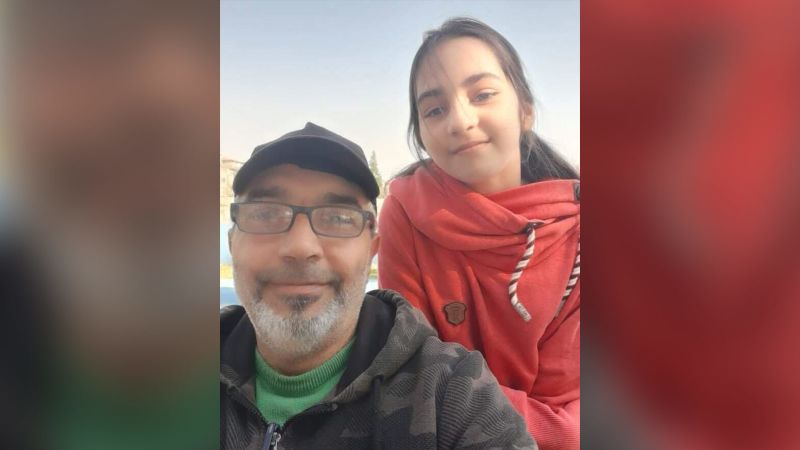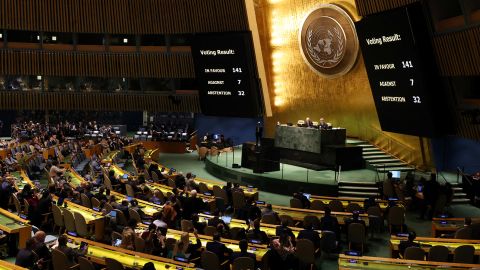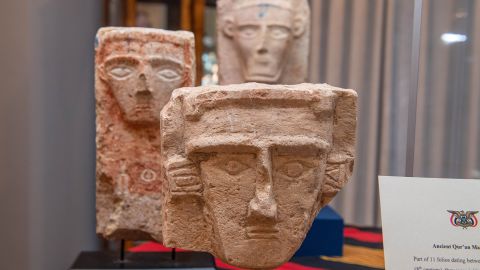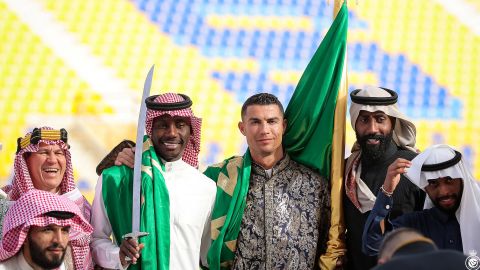
Editor’s Note: A version of this story first appeared in CNN’s Meanwhile in the Middle East newsletter, a three-times-a-week look inside the region’s biggest stories. Sign up here.
Abu Dhabi, UAE
CNN
—
“She used to jump up and down like a butterfly. Now, she is psychologically broken.”
Samer Sharif, 51, is talking about his 15-year-old daughter Salma, who witnessed the death of her brother and mother in the February 6 earthquake, and who for several days believed was orphaned before unexpectedly being reunited with her father.
After the earthquake struck, Sharif was told that Salma, her 10-year-old brother Mohammed and his ex-wife had all died.
Standing before the building that collapsed on top of his family, in Antakya, southern Turkey, Sharif said that he “met with death at that moment.”
“There is nothing left in Antakya. It’s all gone,” he told CNN.
After sleeping on the streets for two days, Sharif left for Istanbul where he stayed with his sister and her husband.
While there he received some rare good news – his daughter was alive, and recovering in hospital.
The father and daughter were re-united, and while they were relieved, they will never be the same – especially Salma.
And Salma is not the only one.
Around 4.6 million children were living in the 10 Turkish provinces hit by the earthquake, according to UNICEF, and an additional 2.5 million children were affected in neighboring Syria.
UNICEF added that families with children are sleeping in the streets, malls, schools, mosques, bus stations and under bridges, all afraid to sleep indoors should more aftershocks bring buildings down.
“I saw a lot of traumatized kids in Antakya,” said 37-year-old Bilal Kazak, a Kazakhstan-born Turkish citizen who lost his mother and sister in the earthquake.
While food, tents and caravans with some heating have arrived in the days following the earthquake, says Kazak, there still isn’t enough mental health support, especially for children.
Speaking to CNN’s Zain Asher, a spokesperson for Save the Children relief organization in Turkey, Oben Coban, said that victims are showing clear signs of post-traumatic stress disorder (PTSD), especially children, many of whom have been left without parents.
“What we are also seeing is that those children who have lost their education, their families, their hopes, they are now struggling to find a reason to keep themselves in this world,” said Coban.
“At the moment, the only thing that can keep them in their lives is hope for the future.”
For victims in Syria, the earthquake is another crisis amid a devastating 12-year civil war.
Children and families who were recovering from PTSD and ongoing trauma from the scars of war are back in survival mode, Dr. Alexandra Chen, a trauma psychologist treating earthquake victims, told CNN.
“For people who have slowly begun to recover and regain a sense of normalcy and rebuilt their lives over the last decade, this has been terrifying and destabilizing for both children and adults,” said Chen. “Some are still in denial while others are experiencing hallucinations.”
The United Nations estimates over 30,000 lives have been lost in the Syrian civil war. People were already struggling to rebuild their lives, while thousands fled the country seeking refuge in nearby countries.
While a semblance of routine had been established before, Chen says the situation has now changed.
“Prior to the earthquake, therapy was not emergency-based, and we had the time and the space to process very difficult things, especially for those who have experienced torture and sexual violence,” she said, adding that “we’re back in emergency mode.”
Chen says that aid workers are also struggling. Between losing their own family members and homes, while rescuing people from the rubble, their mental health has deteriorated amid the ongoing rescue efforts, she said.
Aid workers say that the mental health struggles are clear and are happening amid needs for more food and shelter.
Making matters worse, the risks of further tremors have not gone away.
“Many people do not feel comfortable living inside (intact buildings),” said Arlan Fuller, director of Emergency Response & Preparedness at Project Hope, a US-based non-profit, non-governmental organization that supports healthcare workers in times of crisis. Fuller and Project Hope are currently on the ground in Gaziantep.
“I’ve heard and seen many situations where people do not want to go back inside,” Fuller told CNN, “Or when they are inside, they are constantly focusing on the chandelier, waiting for it to move.”
Many children are clinging to their parents and can’t let go, he added, noting that repeated aftershocks only act as triggers.
Aftershocks continue to be felt across Turkey. Just on Monday, a magnitude 6.3 aftershock struck Turkey’s southern Hatay province, near the Syrian border, killing at least six people and injuring hundreds.
The Turkish Red Crescent previously said it is providing “psychological first aid” to both adults and children impacted by the earthquake, reported the state news agency Anadolu. These include therapy sessions, as well as psychosocial support tents set up by the ministry of family and the ministry of health, added Anadolu.
Salma, 15, remains distraught. She spends most of her time on her phone and refuses to properly eat, her father Samer says.
“She wants to buy those little hot wheels car toys that Hammoudeh (her brother Mohammed’s nickname) loved to put them on her shelf to look at them and remember him,” said Sharif.
“I keep trying to make her laugh, but it’s not like before.”

The United Nations General Assembly on Thursday overwhelmingly voted to condemn Russia’s war in Ukraine. While the resolution isn’t binding, it sheds light on where nations stand in this conflict one year since it started.
Among Middle East and Arab nations, only Syria rejected the resolution while Algeria, Iran and Sudan abstained. The rest supported it.
Last year, less than a week after Russia’s invasion, the same UN body passed a resolution demanding that Russia withdraw all military forces from Ukraine. During that vote, all Arab and Middle Eastern states voted the same way they did on Thursday except for Iraq, which abstained.
The region has largely made clear that it supports Ukraine’s position in this conflict – publicly at least.
The behind-the-scenes diplomacy over the past year, however, tells a different story. Middle East nations have found themselves in a difficult position, juggling between their obligations to their Western allies and their own interests.
The United Arab Emirates, for example, abstained from a symbolic a UN Security Council resolution condemning the war on February 27 of last year (Russia vetoed that resolution). Less than a week later, it voted in favor of a similar resolution at the General Assembly. UAE officials have said the war demonstrates that the world order is no longer unipolar with the US at its helm. The UAE has also become a safe haven for many Russian citizens and businesses since the war.
Abu Dhabi, along with Saudi Arabia, also counts Russia as an ally in the OPEC+ oil cartel. That alliance allows member states to control the supply of oil, which in turn determines prices. The US warned Saudi Arabia last year that restricting the supply of oil would be tantamount to supporting Russia in the war. That warning fell on deaf ears.
Iran, like Syria, is globally isolated and counts Russia as its main international ally. But the Islamic Republic, whose leaders regularly launch tirades against foreign intervention and imperialism, has abstained from such votes instead of vetoing them as Syria has. This is despite Tehran’s role as a player in the war through its supply of killer drones to Russia.
Israel, too, finds itself in a complicated situation. While it has publicly opposed the war, it has economic, cultural, political and security considerations in its dealings with Russia. What it cares most about with Russia is its influence on Iran and its presence in Syria. Israel regularly carries out airstrikes on Iranian targets in Syria, which it regards as critical to prevent the transfer of missile technology to Lebanon’s Hezbollah militant group. It usually communicates with the Russians ahead of those strikes for deconfliction purposes.
By Abbas Al Lawati
Turkey says may experience more aftershocks greater than magnitude 5
Orhan Tatar, Turkey’s general director of Earthquake and Risk Reduction (AFAD) said on Thursday at a press conference that the country may experience more large aftershocks in the coming days, calling on citizens to stay away from damaged buildings. Following the conference, a magnitude 5 aftershock struck the southern Hatay province.
- Background: Since the first 7.8 quake on February 6, authorities have registered 7,442 aftershocks AFAD said on Tuesday. Forty-one of them were between 5 and 6 magnitude and 450 of them were between 4 and 5 magnitude.
- Why it matters: Aftershocks have been frequent and deadly, have complicated recovery operations and rebuilding efforts and have prevented survivors from returning indoors.
Tunisian president denies racism but repeats view that migration is a plot
Tunisian President Kais Saied has repeated his assertion that an increase of migrants from sub-Saharan Africa was part of a conspiracy to change Tunisia’s demographics and denied criticism by rights groups that his views were racist, Reuters reported.
- Background: Saied on Tuesday ordered security forces to halt all illegal immigration into Tunisia and said any undocumented migrants must leave, comments that prompted some strong criticism. Speaking to Interior Minister Tawfiq Charfeddine in a video posted online, Saied said his opponents had twisted his comments in order to spread discord. Rights groups have accused Saied of racism and announced plans to protest.
- Why it matters: Tunisia is a major departure point for migrants seeking to cross the Mediterranean and over the past year there has been a big increase in the number of Tunisians and other Africans trying to reach Europe.
Oman opens airspace to Israeli airlines in landmark move
The Gulf state of Oman has opened its airspace to Israeli airlines in a landmark move that will cut the carriers’ flights from Israel to Asia by up to two hours. The nation’s civil aviation authority said on Twitter that its “airspace is open for all carriers that meet the requirements of the authority for overflying.” Israeli Foreign Minister Eli Cohen tweeted that it was “another great step toward regional integration” and “a day of celebration for Israel.”
- Background: The move follows Saudi Arabia’s decision in July to open its own airspace to Israeli carriers in a deal brokered by the United States. The Israeli foreign ministry said on Thursday that the aviation announcement came after months of talks with Omani authorities.
- Why it matters: Israel needed Oman’s approval to use the shorter corridor to Asia. The move is a diplomatic victory for the Netanyahu government, which has made normalization with Arab nations a top priority. Oman has no diplomatic relations with Israel and normalization is a controversial topic due to Israeli-Palestinian conflict. In December, the Gulf state’s elected Shura Council proposed tightening an Israel boycott law.

The US has repatriated 77 looted artifacts to Yemen, including dozens of ancient funerary stones linked to a disgraced New York art dealer and 11 folios from early Qurans.
But as part of a landmark agreement the Smithsonian’s National Museum of Asian Art in Washington, DC will care for and store the items for at least two years as Yemen remains engulfed in a bitter civil war.
Among the artifacts being returned are 65 funerary stones, known as “stelae,” that date back to the second half of the first millennium BC. Featuring engraved faces, some of the objects contain traces of pigment or inscriptions revealing the names of the deceased.
A museum spokesperson told CNN that the stones were most likely looted from archaeological sites in northwestern Yemen. The Quranic folios are meanwhile thought to date back to the 9th century. An inscribed bronze bowl is also among the cache of artifacts.
The partnership between the Smithsonian and Yemen’s government was announced at a repatriation ceremony hosted by the country’s embassy in Washington, D.C. on Tuesday. As part of the agreement, some of the items could be publicly exhibited at the museum, including in its current show “Ancient Yemen: Incense, Art, and Trade.” Yemen’s government will have the option to extend the partnership after two years, depending on the state of unrest in the country.
The country’s ambassador to the United States, Mohammed Al-Hadhrami, said in a statement that “on behalf of the people and Government of Yemen, we are thrilled to see Yemen retaking ownership of its cultural heritage.”
Read more about the artifacts here.

